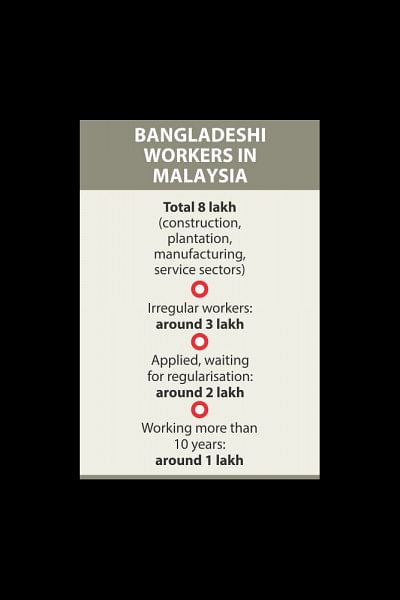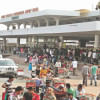Worries grow over jobs in Malaysia

Thousands of Bangladeshis are facing risks of arrest and deportation from Malaysia as its rehiring programme, launched two years ago to legalise undocumented workers, ends today.
The risks have been heightened also as the new Malaysian government, which came to power last month, has recently decided to cancel work permits of the migrants employed for more than 10 years.
In such a situation, the Bangladeshis, who fall under the two categories, are passing days anxiously. They don't know what lies ahead.
“I am living in fear as police are supposed to start a massive raid after the end of the rehiring programme on June 30,” said Amir Hossain, a Bangladeshi who has been working in Kuala Lumpur since 2014.
Amir said he left his legitimate job as the pay was not good and started working for another company. It made him an irregular worker there.
After the rehiring programme was introduced, he paid an agent 5,000 Malaysian ringgits (about Tk 1 lakh) for the legalisation of his work status. But the agent disappeared with the money, Amir told The Daily Star over the phone a couple of days ago.
“I don't know what to do now. I am totally messed up.”
Haridas Paul, another Bangladeshi, said the rehiring programme had been designed in such a way that the workers could not deal with the Malaysian immigration department directly. They needed to contact the department through agents, he said.
“These agents have their sub-agents. Often, workers are fooled by the agents and the sub-agents and are left helpless,” he said, adding, “If such workers are sent back home, it will be a total injustice”.
Currently, around eight lakh Bangladeshis are working in Malaysia, which is hosting about six million foreign workers.
Of the Bangladeshis, an estimated three lakh could be undocumented while another one lakh are facing cancellation of their work permits, according to different migrant rights organisations.
Of the three lakh people, some two lakh have applied for registration under the programme, said an official at the Bangladesh High Commission in Kuala Lumpur.
But, there is no guarantee that all of them would be legalised.
Gautam Roy, a former editor of the Probashi Kantha, a newspaper that mainly covers news related to migrant issues, said the unregistered Bangladeshi workers would have to return home if the Malaysian government did not shift its stance on the issue.
However, the Malaysian government, which is investigating several corruption cases against high-ups of the previous government, seemed firm to curb malpractices in the labour recruitment sector, he said.
The Malaysian authorities have recently suspended 10 Bangladeshi recruiting agents, who were authorised by the previous government in 2016.
Malaysian newspaper, The Star, reported on June 22 that the syndicate of 10 agents, led by a Bangladeshi businessman in Malaysia, allegedly raked around 2 billion Malaysian Ringgit over the recruitment of more than 100,000 Bangladeshi workers.
Each worker had to pay RM 20,000 (Tk 4 lakh), which is 10 times more than that was set in the government-to-government plus deal signed between Malaysia and Bangladesh early in 2016.
Malaysian Home Minister Muhyiddin Yassin said after the end of the rehiring programme, the immigration department would take action against irregular foreign workers and the employers who would not recruit workers under the programme.
A 3+1 Programme, which allows amnesty for irregular migrants to return to their home countries, would continue until August 30. It would enable them to return home voluntarily, Muhyiddin told the Malaysian media on May 31.
In another move, the Malaysian home ministry in a press release on June 22 said the government decided to cancel work permits of those migrants who have been working in the Southeast Asian country for more than 10 years.
“Right now we are facing oversupply [of foreign workers]. That's the problem we need to solve immediately,” he was quoted as saying by the media.
HOW THEY BECOME UNDOCUMENTED?
Majority of the Bangladeshi migrants in Malaysia went to the country with valid work visas. However, many of them quit their legal jobs because of low wages or non-payment or other forms of abuse at workplace, said migrant rights activists.
According to a memorandum submitted to the Malaysian home ministry recently by seven migrant rights bodies, many workers became undocumented because of gross violations of migration rules and exploitation at workplace.
Again, when workers tried to get regularised, they were cheated by their agents, it said.
Journalist Gautam said many from Bangladesh arrived in Malaysia on student visas and later started working full time. He said those were either defrauded by fake Malaysian colleges and universities or they wanted to work to earn money.
Another group of undocumented Bangladeshis are the ones who made their way into the Southeast Asian country illegally through the sea route, he said.
Abu Hayat, who researches labour migration to Malaysia, told The Daily Star over phone from Kuala Lumpur that he knew some 100 Bangladeshis who reached the country legally late last year.
As they were not given jobs as promised by a Malaysian company, they started working for another firm, he said, adding, the Bangladeshis have now become irregular workers but “it's not their fault”.
Talking about the rehiring programme, Adrian Pereira, executive director of North South Initiative, one of the seven organisations that submitted the memorandum, said the scheme was not transparent and had no accountability when it came to agents and sub-agents.
“Give more time to the migrants to process and secure their work visa status. If workers are not given enough time to make decisions, they will be forced to take high risky actions by going underground and even collaborating with traffickers and smugglers,” he told The Daily Star.
BANGLADESH GOVERNMENT IN THE DARK
If Malaysia deports the migrants, it would create a lot of problems for the workers and their families who might not recoup the migration cost, said Gautam.
The Bangladesh government should come forward and negotiate with the Malaysian authorities to address the issue. Otherwise, the Bangladeshis in that country would face disastrous consequences, he said.
Contacted, Namita Halder, secretary at the expatriates' welfare ministry, said they had no information about the end of the rehiring programme and the possible arrest and deportation of irregular Bangladeshi workers from Malaysia.
“Malaysia has not communicated with us about it. So, we cannot say anything about it,” she told The Daily Star on Wednesday.

 For all latest news, follow The Daily Star's Google News channel.
For all latest news, follow The Daily Star's Google News channel. 








Comments